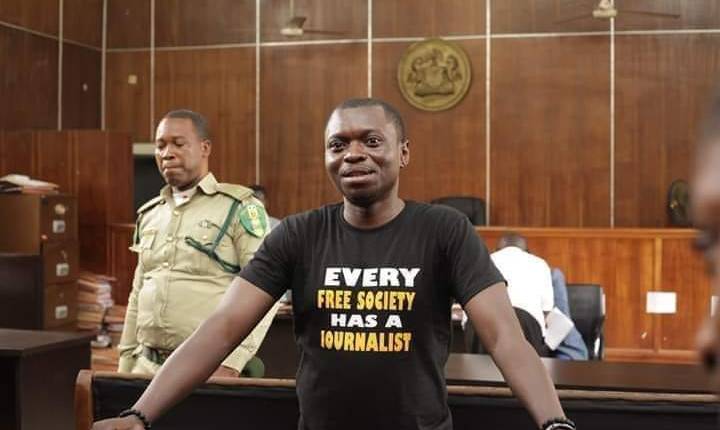Simon Amobeda, the presiding judge of the Calabar division of the Federal High Court has set aside Monday, December 9, 2019, to rule on the application of the defendants in suit No FHC/CA/59C/2019 for the provision of an electronic verbatim recording device, while lawyers and the public will be barred from using phones inside the courtroom from January 2020.
Agba Jalingo, the defendant, a journalist and human rights activist, is facing charges of terrorism and conspiracy among others.
Before commencing hearing for cases listed for the day, Amobeda who seemed not happy with comments on social media asked journalists to get “clearance from the station registrar” before covering proceedings.
He said, “The era of reporting about this court anyhow is gone.”
He asked journalists to be careful of what they report and to “get clarifications from their lawyers” if they are not sure of what to write.
He emphasized that he was not asking journalists to stop reporting, adding “there is a lot being written on social media.”
Amobeda then ordered that from January 2020, everyone including lawyers entering the court will be required to keep their phones in their cars or elsewhere before entering the court.
Meanwhile, the defendant had in a motion filed on November 13, 2019, brought pursuant to Section 36 of the constitution of the Federal Republic of Nigeria 1999 as amended, sought the leave of the court to provide an electronic verbatim recorder independent of the long handwriting of the trial judge.
The motion is supported by an 18-paragraph affidavit, a four-paragraph affidavit of urgency; all deposed to by James Ibor, a counsel to Jalingo, as well as a further affidavit deposed to by Adeyinka Olumide-Fusika, a senior advocate of Nigeria and lead counsel to the defendant dated November 19th.
The defence team led by Ibor relied on its written address and the paragraphs in the three affidavits as part of its oral argument in support of the motion.
The prosecution led by Dennis Tarhemba, a deputy superintendent of police, in their response, had filed a 22-paragraph counter-affidavit on November 22, 2019, and deposed to by Inspector Ibe Ihezuo of the State Criminal and Investigation Department of the Nigerian Police Force in Calabar.
Tarhemba relied on his written address and paragraphs in the two counter affidavits he filed as part of his argument against the motion and sought the leave of the court to debate orally.
When granted the leave, he submitted that his reaction to the defendant’s application dated November 13, 2019, and the further affidavit dated November 19, 2019, had not been controverted and therefore should be deemed admitted and cited the case of Obumsele and Anor vs Uwakwe 2019 (Supreme Court) to back his argument.







